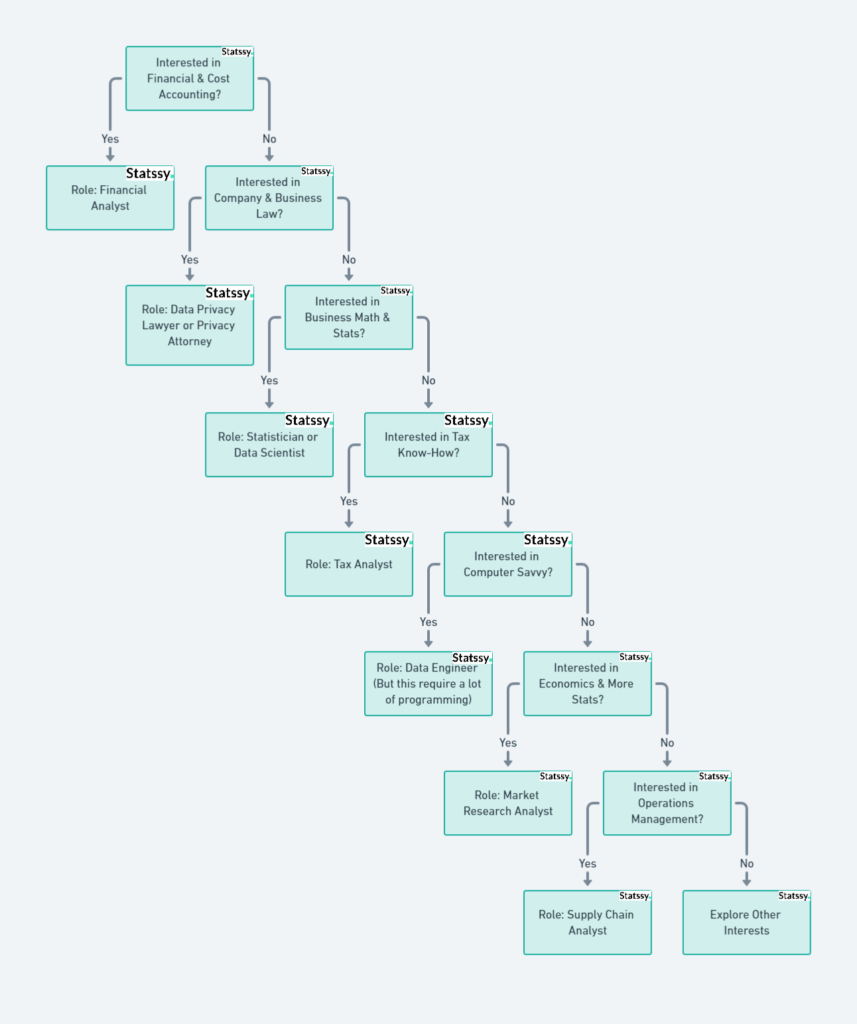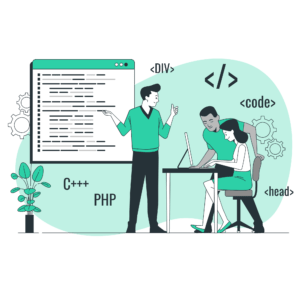Hey there, B. Com grads! Feeling a bit lost after graduation? Wondering what’s next? How about stepping into the dynamic world of data analytics? Trust us, it’s not as daunting as it sounds, and your B. Com background has already given you a head start!
So, what’s the game plan? We’ve got you covered:
- Find Your Passion: First things first, ask yourself if data analytics excites you. If numbers and patterns get your heart racing, you’re in the right place.
- Skill Up: You’ll need some technical know-how. We’re talking Excel, Statistics, SQL, and maybe even a bit of Python or R. Plus, you’ll want to get familiar with data visualization tools like Tableau and Power BI.
- Become a Data Whiz: Master techniques like statistical analysis, predictive modelling, and even machine learning. Sounds cool, right?
- Get Your Hands Dirty: The best way to learn is by doing. Participate in small projects, enter data analysis competitions, or even freelance. The experience is priceless.
- Show and Tell: Create a portfolio to showcase your projects. It’s your personal billboard to the world.
- Network Like a Pro: Connect with industry experts, attend webinars, and join online forums. You never know, your next mentor could be just a click away.
- Never Stop Learning: The data analytics field is always evolving. Keep up with the latest trends to stay ahead of the game.
And guess what? Your B. Com degree has already laid a strong foundation for you to build upon. To make things even easier, we’ve linked to some awesome courses and projects by Statssy that can help you hit the ground running.
So, are you ready to pivot from B. Com to data analytics and open doors to a world of opportunities? Let’s do this!
Need help with R/Stata?
Connect on Whatsapp
What Does a Data Analyst Actually Do?
Before we jump into the nitty-gritty, let’s get a clear picture of what a Data Analyst does. Imagine being a detective but for businesses. You’ll sift through mountains of data to find golden nuggets of information that can help a company make smarter decisions. You’re not just dealing with numbers; you’re telling a story that could influence the company’s next big move.
How Your B. Com Degree Fits In
Okay, so you’ve got a B. Com degree. Awesome! But how does that help you in data analytics? Let’s break it down: Data Analyst After B. Com
Financial & Cost Accounting
- What it means for you: You’ll often find yourself knee-deep in financial data. Your accounting background will help you make sense of it all.
- Scenario 1: Imagine you’re working for a manufacturing firm. You could analyze production costs and spot trends that could save the company some serious cash.
- Scenario 2: Or maybe you’re in a financial services company, dissecting income statements. Your accounting skills will help you spot red flags or opportunities for financial growth.
Business Math & Stats
- What it means for you: You’ll use math and stats to make your data sing.
- Scenario 1: Need to forecast sales? Your stats background will help you pick the right model and interpret the results.
- Scenario 2: Running an A/B test for a website redesign? Your math skills will help you design the test, crunch the numbers, and offer actionable insights.
Company & Business Law
- What it means for you: You’ll need to know the legal landscape when it comes to data.
- Scenario 1: Handling customer data? Your law knowledge will help you keep things on the up-and-up, legally speaking.
- Scenario 2: If a data breach happens (knock on wood), you’ll know how to navigate the legal maze.
Tax Know-How
- What it means for you: If you’re eyeing roles in financial institutions or tax firms, your tax knowledge will come in handy.
- Scenario 1: Working for a tax consulting firm? You could analyze tax data to help clients save money.
- Scenario 2: In a corporate setting, you could analyze financial data to plan for tax expenses accurately.
Computer Savvy
- What it means for you: You’ll be using various software tools, and your B. Com has already given you a taste of it.
- Scenario 1: Analyzing sales data for a grocery chain? Your software skills will help you present your findings clearly.
- Scenario 2: Working in marketing? Your tech skills will help you extract valuable customer data from CRMs to improve marketing strategies.
Economics & More Stats
- What it means for you: Your economics and stats background will help you interpret market trends and consumer behaviour.
- Scenario 1: In real estate? You could forecast housing prices based on economic indicators.
- Scenario 2: In retail? Your skills can help predict product demand, aiding in inventory and pricing strategies.
Operations Management
- What it means for you: Operations Management in your B. Com curriculum equips you with the skills to optimize processes, make informed decisions, and think systematically.
- Interdisciplinary Team Approach: The complex nature of operations often requires insights from multiple disciplines. Your understanding of this approach minimizes the risk of poor decision-making.
- Boosts Creative Decision-Making: The mathematical tools and techniques you’ve learned can help you evaluate various alternatives, making your decision-making process more efficient and effective.
- Systems Approach: Understanding that a business is a system with interconnected sub-systems will help you make decisions that benefit the organization as a whole.
- Holistic View: Your training encourages you to consider the broader impact of any decision, not just its immediate effects.
- Objective Decision-Making: Operations Management teaches you to find the optimal solution to problems, aligning with the organization’s goals.
- Real-world Scenario 1: As a data analyst in a logistics company, your understanding of Operations Management can help you optimize supply chain processes, reducing costs and improving efficiency.
- Real-world Scenario 2: In a healthcare setting, you could use your skills to improve patient flow and resource allocation, ultimately enhancing patient care.
Here’s a table that summarizes the key points for quick reference:
| B. Com Subject Area | Relevance in Data Analytics | Real-world Scenarios | Job Role | Types of Companies | Example |
|---|---|---|---|---|---|
| Financial & Cost Accounting | Analyze Financial Data | Manufacturing, Financial Services | Financial Analyst | Investment Banks, Accounting Firms | ICICI Bank, KPMG |
| Business Math & Stats | Apply Statistical Models | Sales Forecasting, A/B Testing | Statistician/Data Scientist | Tech Companies, Pharmaceuticals | Infosys, Dr. Reddy’s Laboratories |
| Company & Business Law | Navigate Legal Landscape | Data Privacy, Data Breach Handling | Data Privacy Lawyer/Privacy Attorney | Law Firms, Tech Companies | Trilegal, Wipro |
| Tax Know-How | Plan for Tax Expenses | Tax Consulting, Corporate Tax Planning | Tax Analyst | Accounting Firms, Corporations | Deloitte, Reliance Industries |
| Computer Savvy | Use Software Tools | Data Analysis Tools, CRMs | Data Engineer | Tech Companies, E-commerce | Flipkart, TCS |
| Economics & More Stats | Interpret Market Trends | Real Estate, Retail Business | Market Research Analyst | Marketing Agencies, Retailers | Nielsen, Future Group |
| Operations Management | Optimize Processes | Logistics, Healthcare | Supply Chain Analyst | Logistics Companies, Healthcare Providers | Blue Dart, Apollo Hospitals |
To put things into perspective, let me share a Career Path Flowchart which will help you make better decisions.

Up next, we’ll guide you through the essential steps to transition from your B. Com degree to a fulfilling data analyst role. Stay tuned!
Your Roadmap to Data Analyst
Alright, you’ve got that B. Com degree in your pocket, and you’re eyeing a career in data analytics. So, what’s next? Let’s break it down step-by-step.
Find Your Data Niche
Data analytics is a vast field. Do you see yourself crunching numbers for a financial firm, or perhaps diving into consumer behavior for a retail giant? Your B. Com subjects like Sales Management and Financial Studies can help you pinpoint what really excites you.
Your Toolbox
Navigating the world of data analytics requires a well-equipped toolbox. Let’s break down the essential tools and skills you’ll need, explaining what each one is and why it’s important.
SQL: The Data Whisperer
- What it is: SQL (Structured Query Language) is the standard language for relational database management.
- Why it’s important: It’s your go-to tool for organizing, querying, and manipulating data.
- Examples:
- Retrieving specific data from a large database.
- Updating records to reflect real-time changes.
- Creating summary reports from raw data.
Python/R: Your Data Swiss Army Knife
- What it is: Python and R are programming languages specifically designed for data analysis.
- Why it’s important: They offer a wide range of libraries and functions for data manipulation, statistical analysis, and visualization.
- Examples:
- Cleaning up messy data.
- Running complex statistical models.
- Creating interactive data visualizations.
Microsoft Excel: Much More Than Spreadsheets
- What it is: Excel is a spreadsheet program that can handle everything from simple calculations to complex data analysis.
- Why it’s important: It’s a user-friendly yet powerful tool for initial data sorting, analysis, and visualization.
- Examples:
- Sorting and filtering data to find specific insights.
- Using pivot tables to summarize and analyze large datasets.
- Applying formulas to calculate key performance indicators.
Creating Analytical PowerPoint Presentations: Tell Your Data Story
- What it is: The art of presenting your data and findings in a PowerPoint format.
- Why it’s important: It helps you communicate complex data findings in an easily digestible format.
- Examples:
- Crafting a narrative around your data.
- Embedding live data dashboards.
- Summarizing key findings for executive audiences.
Data Visualizations: A Picture is Worth a Thousand Data Points
- What it is: The practice of turning data into visual elements like graphs and charts.
- Why it’s important: Visuals make complex data more understandable, accessible, and usable.
- Examples:
- Using bar charts to compare sales data.
- Creating heat maps to identify high-performing regions.
- Designing time-series graphs to track changes over time.
Writing Analytics Reports: The Blueprint of Your Analysis
- What it is: A structured document that details your data analysis process and findings.
- Why it’s important: It serves as a record and guide, providing actionable insights and recommendations.
- Examples:
- Starting with an executive summary that outlines key findings.
- Detailing the methodology used for data collection and analysis.
- Ending with a set of actionable recommendations based on the data.
By the way, Statssy offers kickstarter courses in Python, SQL, MS Excel, and Statistics using MS Excel that are worth checking out.
Become a Data Maestro
You’ll need to master various data analysis techniques, from regression analysis to time-series forecasting. Your B. Com subject, Business Mathematics and Statistics, gives you a head start here.
Get That Certification
Statssy offers a Certified Data Analyst course that can make your resume shine brighter than a diamond.
Roll Up Your Sleeves
Theory is great, but practice makes perfect. Your B. Com dissertation can serve as a launchpad for small projects. Also, consider entering online data analysis competitions. Statssy has a treasure trove of datasets you can play around with.
Show and Tell
Create a portfolio that showcases your projects. This way, employers can see your problem-solving skills in action.
Network Like a Pro
Attend industry events, webinars, and don’t underestimate the power of LinkedIn. You never know when an opportunity might knock.
Never Stop Learning : Data Analyst After B. Com
The data analytics landscape is ever-changing. Keep your skills fresh and stay updated with industry trends. Remember, learning was a big part of your B. Com journey, and it doesn’t stop here.
Final Thoughts
Transitioning from a B. Com to a data analyst isn’t just possible; it’s a journey filled with opportunities for growth and specialization. Your B. Com degree has laid a strong foundation, and with a bit of focus and effort, you can build a fulfilling career in data analytics.
So, what are you waiting for? Kickstart your data analytics journey with Statssy today!





